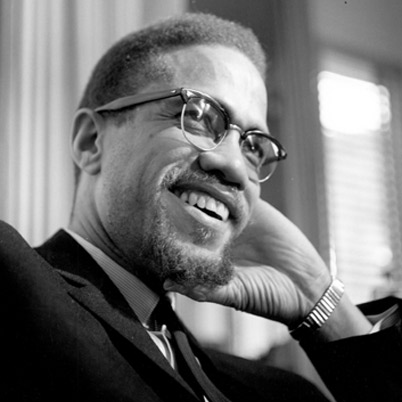 Born May 19, 1925 in Omaha, Nebraska, this black nationalist leader was a charismatic spokesman for the Nation of Islam until breaking with the group shortly before his 1965 assassination. Malcolm X attended West Junior High School, where he was the school’s only black student. He excelled academically and was well liked by his classmates, who elected him class president. However, he later said that he felt that his classmates treated him more like the class pet than a human being. The turning point in Malcolm X’s childhood came in 1939, when his English teacher asked him what he wanted to be when he grew up and he answered that he wanted to be a lawyer. His teacher responded, “One of life’s first needs is for us to be realistic… you need to think of something you can be… Why don’t you plan on carpentry?” Having thus been told in no uncertain terms that there was no point in a black child pursuing education, Malcolm X dropped out of school the next year at the age of 15. After quitting school, Malcolm X moved to Boston to live with his older half-sister Ella, about whom he later recalled, “She was the first really proud black woman I had ever seen in my life. Out on his own on the streets of Boston, Malcolm X became acquainted with the city’s criminal underground, soon turning to selling drugs. He got another job as kitchen help on the Yankee Clipper train between New York and Boston and fell further into a life of drugs and crime. Sporting flamboyant pinstriped zoot suits, he frequented nightclubs and dance halls and turned more fully to crime to finance his lavish lifestyle. This phase of Malcolm X’s life came to a screeching halt in 1946 when he was arrested on charges of larceny and sentenced to ten years in jail.To pass the time of his incarceration, Malcolm X read constantly, devouring books from the prison library in an attempt make up for the years of education he had missed by dropping out of high school. Also while in prison, he was visited by several siblings who had joined to the Nation of Islam, a small sect of black Muslims who embraced the ideology of black nationalism – the idea that in order to secure freedom, justice and equality, black Americans needed to establish their own state entirely separate from white Americans. Malcolm X converted to the Nation of Islam while in prison, and upon his release in 1952 he abandoned his surname “Little,” which he considered a relic of slavery, in favor of the surname “X” – a tribute to the unknown name of his African ancestors.
Born May 19, 1925 in Omaha, Nebraska, this black nationalist leader was a charismatic spokesman for the Nation of Islam until breaking with the group shortly before his 1965 assassination. Malcolm X attended West Junior High School, where he was the school’s only black student. He excelled academically and was well liked by his classmates, who elected him class president. However, he later said that he felt that his classmates treated him more like the class pet than a human being. The turning point in Malcolm X’s childhood came in 1939, when his English teacher asked him what he wanted to be when he grew up and he answered that he wanted to be a lawyer. His teacher responded, “One of life’s first needs is for us to be realistic… you need to think of something you can be… Why don’t you plan on carpentry?” Having thus been told in no uncertain terms that there was no point in a black child pursuing education, Malcolm X dropped out of school the next year at the age of 15. After quitting school, Malcolm X moved to Boston to live with his older half-sister Ella, about whom he later recalled, “She was the first really proud black woman I had ever seen in my life. Out on his own on the streets of Boston, Malcolm X became acquainted with the city’s criminal underground, soon turning to selling drugs. He got another job as kitchen help on the Yankee Clipper train between New York and Boston and fell further into a life of drugs and crime. Sporting flamboyant pinstriped zoot suits, he frequented nightclubs and dance halls and turned more fully to crime to finance his lavish lifestyle. This phase of Malcolm X’s life came to a screeching halt in 1946 when he was arrested on charges of larceny and sentenced to ten years in jail.To pass the time of his incarceration, Malcolm X read constantly, devouring books from the prison library in an attempt make up for the years of education he had missed by dropping out of high school. Also while in prison, he was visited by several siblings who had joined to the Nation of Islam, a small sect of black Muslims who embraced the ideology of black nationalism – the idea that in order to secure freedom, justice and equality, black Americans needed to establish their own state entirely separate from white Americans. Malcolm X converted to the Nation of Islam while in prison, and upon his release in 1952 he abandoned his surname “Little,” which he considered a relic of slavery, in favor of the surname “X” – a tribute to the unknown name of his African ancestors.
After serving time, Malcolm X traveled to Detroit, where he worked with the leader of the Nation of Islam, Elijah Muhammad, to expand the movement’s following among black Americans nationwide. Malcolm X became the minister of Temple No. 7 in Harlem and Temple No. 11 in Boston, while also founding new temples in Harford and Philadelphia. In 1960, he established a national newspaper, Muhammad Speaks, in order to further promote the message of the Nation of Islam. Articulate, passionate and a naturally gifted and inspirational orator, Malcolm X exhorted blacks to cast off the shackles of racism “by any means necessary,” including violence. “You don’t have a peaceful revolution,” he said. “You don’t have a turn the cheek revolution. There’s no such thing as a nonviolent revolution.” Such militant proposals – a violent revolution to establish an independent black nation – won Malcolm X large numbers of followers as well as many fierce critics. Due primarily to the efforts of Malcolm X, the Nation of Islam grew from a mere 400 members at the time he was released from prison in 1952 to 40,000 members by 1960.
Malcolm X married Betty Sanders, a fellow member of the Nation of Islam, in 1958, and they had four children together. Later known as Betty Shabazz, she became a prominent civil rights and human rights activist. By the early 1960s, Malcolm X had emerged as a leading voice of a radicalized wing of the civil rights movement, presenting an alternative to Dr. Martin Luther King’s vision of a racially integrated society achieved by peaceful means. Dr. King was highly critical of what he viewed as Malcolm X’s destructive demagoguery. “I feel that Malcolm has done himself and our people a great disservice,” he said.
Philosophical differences with King were one thing; a rupture with Elijah Muhammad proved much more traumatic. In 1963, Malcolm X became deeply disillusioned when he learned that his hero and mentor had violated many of his own teachings, most flagrantly by carrying on many extramarital affairs; Muhammad had, in fact, fathered several children out of wedlock. Malcolm’s feelings of betrayal, combined with Muhammad’s anger over Malcolm’s insensitive comments regarding the assassination of President John F. Kennedy, led Malcolm X to leave the Nation of Islam in 1964.
On the evening of February 21, 1965, at the Audubon Ballroom in Manhattan, where Malcolm X was about to deliver a speech, three gunmen rushed the stage and shot him 15 times at point blank range. Malcolm X was pronounced dead on arrival at Columbia Presbyterian Hospital shortly thereafter. He was 39 years old. The three men convicted of the assassination of Malcolm X were all members of the Nation of Islam: Talmadge Hayer, Norman 3X Butler and Thomas 15X Johnson.
In the immediate aftermath of Malcolm X’s death, commentators largely ignored his recent spiritual and political transformation and criticized him as a violent rabble-rouser. However, Malcolm X’s legacy as a civil rights hero was cemented by the posthumous publication in 1965 of The Autobiography of Malcolm X: As Told to Alex Haley. At once a harrowing chronicle of American racism, an unsparing self-criticism and an inspiring spiritual journey, the book, transcribed by the acclaimed author of Roots, instantly recast Malcolm X as one of the great political and spiritual leaders of modern times. Named by Time magazine as one of ten “required reading” nonfiction books, The Autobiography of Malcolm X has enshrined Malcolm X as a hero to subsequent generations of radicals and activists.
Malcolm X’s greatest contribution to society was underscoring the value of a truly free populace by demonstrating the great lengths to which human beings will go to secure their freedom. “Power in defense of freedom is greater than power in behalf of tyranny and oppression,” he said. “Because power, real power, comes from our conviction which produces action, uncompromising action.”
Today BCG pays homage to Malcom X, a Black History Legend.
Source: Bio






Thank you for sharing your thoughts. I really
appreciate your efforts and I will be waiting for your next write ups thanks once again.
Feel free to visit my website; safe over the counter otc pain relief for dogs